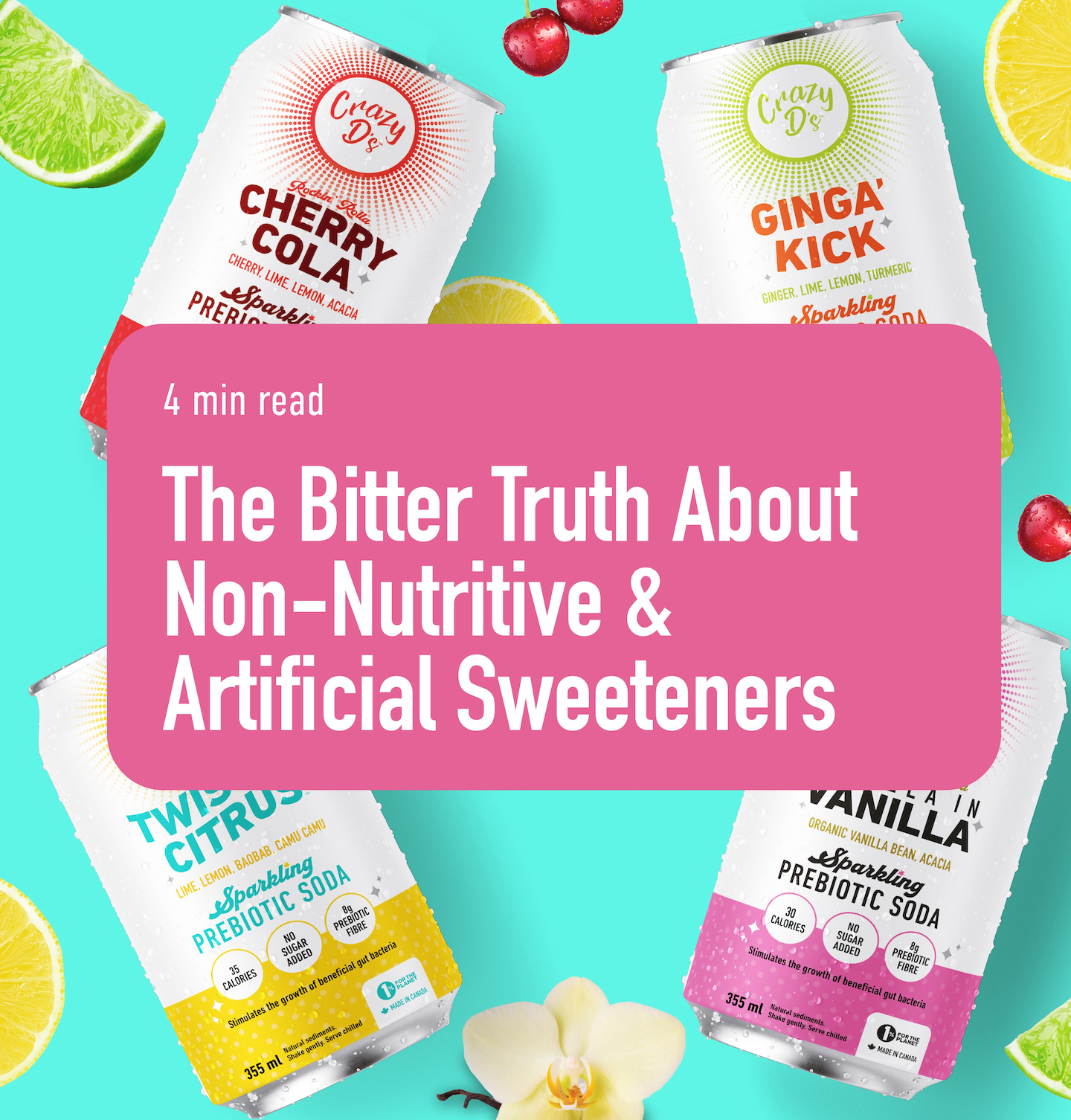

· By Shruti Arulmani
The Bitter Truth About Non-Nutritive & Artificial Sweeteners
Reading Time: 4 min
As humans, we've had a long love affair with sweetness, so it's no wonder that sugar has become a staple in our diets. However, many people are now conscious of their sugar intake and seeking alternative ways to satisfy their sweet cravings.
This quest for alternatives has led to the rise of many non-nutritive sweeteners, a seemingly guilt-free alternative to sugar. But their consumption is not without its own set of risks.
The Hidden Culprits: Non-Nutritive Sweeteners Definition and Examples
Non-Nutritive Sweeteners are commonly added to various foods and drinks, including diet sodas, sugar-free candies, and low-calorie desserts. These sweeteners are called "non-nutritive" because they add little to no calories or nutrients to the diet.
These sweeteners come in various forms, such as Aspartame (Equal), Saccharin (Sweet'N Low), Sucralose (Splenda), Stevia, Monkfruit, and Erythritol. Each of these sweeteners has its unique properties and taste profiles but often leaves an intrinsic lingering bitter aftertaste.
These sugar substitutes taste much sweeter than sugar, so you only need a little to make something sweet. They may even seem like a dream come true for those looking to cut back on calories and maintain a healthier lifestyle. However, beneath the surface, there are some not-so-sweet downsides to these sugary substitutes.
What are the Long-term Impacts of Artificial Sweeteners?
While non-nutritive sweeteners may look like an attractive alternative for those looking to reduce their overall sugar intake, concerns have been raised about their potential health effects.
The World Health Organization (WHO) has advised against the excessive use of these sweeteners, citing limited evidence on their long-term safety and potential negative impacts on health. Some studies have also suggested a possible link between non-nutritive sweeteners and increased appetite, weight gain, and metabolic disorders.
“NSS [Non-Sugar Sweeteners] are not essential dietary factors and have no nutritional value. People should reduce the sweetness of the diet altogether, starting early in life, to improve their health.”
- Francesco Branca, WHO Director for Nutrition and Food Safety
Do Non-Nutritive Sugars Impact Your Metabolism?
Despite being calorie-free, non-nutritive sweeteners can disrupt the body's natural ability to regulate calorie intake. When your taste buds experience intense sweetness without the expected caloric load, it triggers a metabolic miscommunication. This confusion can lead to overcompensation, as your body expects a higher energy intake than it gets.
Ironically, this may manifest as an increased desire for calories later on, potentially contributing to unexpected weight gain. In essence, the calorie-free promise of artificial sweeteners may come with consequences for our body's delicate metabolic processes.
The Not-So-Sweet Impact of Non-Nutritive Sugars on Gut Health
Non-nutritive sweeteners stand accused of more than just their potential impact on calorie regulation—they may be upsetting the intricate balance of our gut microbiota.

Your gut houses a thriving community of beneficial bacteria, essential for overall well-being, and artificial sugars could be the disruptors in this microbial harmony. A healthy gut is crucial for a range of health aspects, including digestion, immunity, and even mental health. The delicate balance within our gut microbiota is a key player in supporting our overall health, and the introduction of non-nutritive sweeteners might just be throwing this system off-kilter.
Insulin Resistance Concerns Associated with Non-Nutritive Sugars
New findings have sparked worries regarding how non-nutritive sweeteners may affect insulin sensitivity. Insulin resistance, a crucial element in the development of type 2 diabetes, is becoming increasingly common globally, demanding our focus. Recent studies suggest that the use of non-nutritive sweeteners might influence insulin sensitivity, potentially contributing to the challenges associated with diabetes.
As concerns about diabetes continue to rise, understanding the potential impact of these sweeteners on insulin resistance becomes a critical aspect of our collective health consciousness.
Sweetening the Craving Cycle
Non-nutritive sweeteners have been known to perpetuate the cycle of sweet cravings. These sugar substitutes, with their intense sweetness, have a sneaky way of dulling our taste buds. This means that naturally sweet foods might not satisfy our cravings as much, pushing us to reach for even sweeter options.
It's a bit like a sugary snowball effect - non-nutritive sweeteners could leave you on an unexpected journey, constantly seeking sweeter and sweeter treats. So, that innocent sprinkle of sweetness might just be setting off a cycle of cravings you didn't bargain for.
Navigating the Sugar Minefield
The allure of low-calorie sweeteners may seem like a sweet deal, but navigating the realm of non-nutritive sweeteners requires caution. These sugar substitutes, while tempting, influence crucial aspects of our health, impacting everything from metabolism to the delicate balance of our gut microbiota.
In the big picture, moderation is the guiding principle. It's important to grasp the nuances of sugars – be they natural, refined, or artificial – as this knowledge empowers us to make wise decisions for our well-being and health.
So, as we seek that perfect balance between satisfying our sweet cravings and caring for our health, let's approach the world of sweeteners with a mindful stride. After all, a sweet life is not just about the taste; it's about the thoughtful choices we make for our overall well-being.
Embracing Natural Sweetness with Crazy D’s
Crazy D's Sparkling Prebiotic Soda stands out in the beverage market by steering clear of both non-nutritive and excessive natural sugars. Instead, it relies on a thoughtful blend of Yacon Root syrup, Chicory Root fibre, and Baobab Fruit Pulp, offering a naturally sweet taste without the guilt.

Yacon Root syrup, known for its low-calorie content and prebiotic properties, adds a touch of sweetness without the calorie overload. Chicory Root fibre contributes to prebiotic benefits, supporting gut health, and Baobab Fruit Pulp provides essential vitamins, minerals and prebiotics, creating a trifecta of goodness in every sip.
Crazy D's Sparkling Prebiotic Sodas go beyond the traditional soda experience. It's a celebration of natural sweetness, and with no added sugars and a focus on prebiotic fibre, our beverages are a testament to our brand's commitment to delivering a refreshing health-conscious drink. It's time to redefine your soda, one truly guilt-free sip at a time.

Resources
Aliouche, H. (2022). What are the Effects of Artificial Sweeteners on Gut Health?. News-Medical. https://www.news-medical.net/health/What-are-the-Effects-of-Artificial-Sweeteners-on-Gut-Health.aspx#:~:text=Alterations%20in%20the%20gut%20microbiota,increase%20the%20bioavailability%20of%20calories.
Kuhn, C., Bufe, B., Winnig, M., Hofmann, T., Frank, O., Behrens, M., Lewtschenko, T., Slack, J. P., Ward, C. D., & Meyerhof, W. (2004). Bitter taste receptors for saccharin and acesulfame K. The Journal of neuroscience : the official journal of the Society for Neuroscience, 24(45), 10260–10265. https://doi.org/10.1523/JNEUROSCI.1225-04.2004
Mathur, K., Agrawal, R. K., Nagpure, S., & Deshpande, D. (2020). Effect of artificial sweeteners on insulin resistance among type-2 diabetes mellitus patients. Journal of family medicine and primary care, 9(1), 69–71. https://doi.org/10.4103/jfmpc.jfmpc_329_19
Strawbridge, H. (2020). Artificial sweeteners: sugar-free, but at what cost?. Harvard Health Publishing. https://www.health.harvard.edu/blog/artificial-sweeteners-sugar-free-but-at-what-cost-201207165030
World Health Organization. (2023). WHO advises not to use non-sugar sweeteners for weight control in newly released guideline. Use of non-sugar sweeteners: WHO guideline. https://www.who.int/news/item/15-05-2023-who-advises-not-to-use-non-sugar-sweeteners-for-weight-control-in-newly-released-guideline#:~:text=%22NSS%20are%20not%20essential%20dietary,%2C%20to%20improve%20their%20health.%22
- ##BalancedSweetness
- ##BaobabFruitPulp
- ##ChicoryRootFiber
- ##CrazyDSoda
- ##FiberEnrichedDrinks
- ##GutHealth
- ##GutHealthDrinks
- ##HealthyBeverageChoices
- ##HealthyDrinkOptions
- ##LowCalorieSweeteners
- ##NaturalSugarAlternatives
- ##NoAddedSugars
- ##NonNutritiveSugars
- ##NutrientRichSodas
- ##Prebiotic
- ##prebiotic drink
- ##PrebioticBeverages
- ##SmartBeverageChoices
- ##soda
- ##SugarSubstitutes
- ##YaconRootSyrup
- #2023
- #cherrycoke
- #creamsoda
- #equal
- #erythritol
- #healthypop
- #popflavours
- #splenda
- #stevia
- #sweetnlow
